Tauranga woman Robyn Molloy is on a heartfelt mission to trace the family of an English woman who, during World War II, sent a letter to her mother after hearing a message from Vatican Radio confirming the survival of Robyn’s father, Jim Craig, who had been missing and presumed dead.
The story begins with Craig, a New Zealand Army officer seconded to British Military Intelligence during WWII, and his work in Greece, where he played a pivotal role in helping escapees from the German occupation.
In late 1941, Craig was dropped off on the small Greek island of Antiparos by the British submarine HMS Triumph.
Under the command of Lieutenant John S. Huddart, Triumph was part of Operation Isinglass, a covert mission to evacuate British and Commonwealth prisoners of war and resistance fighters.
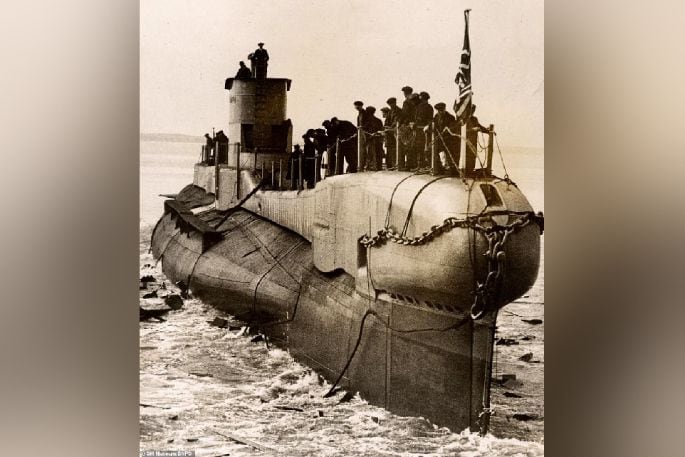
When it foundered, the HMS Triumph submarine (pictured here at its 1939 launch), which had a crew of 39, was on a top-secret mission to recover 18 British commandos from a remote Greek island. Photo / Royal Navy Submarine Museum
Diverted
After completing 20 war patrols, HMS Triumph was set to return to England for a refit and some well-deserved rest and relaxation for its crew, who’d already done their Christmas shopping in Alexandria. However, at the last moment, they were diverted for the special mission by Craig and others.
The submarine, failing to return on January 9, 1942, was declared missing, presumed lost. It had vanished without a trace, along with its entire crew of 64, leaving behind a veil of mystery that has lasted 81 years.
“My father, who had been waiting for its return, was captured,” Molloy said.
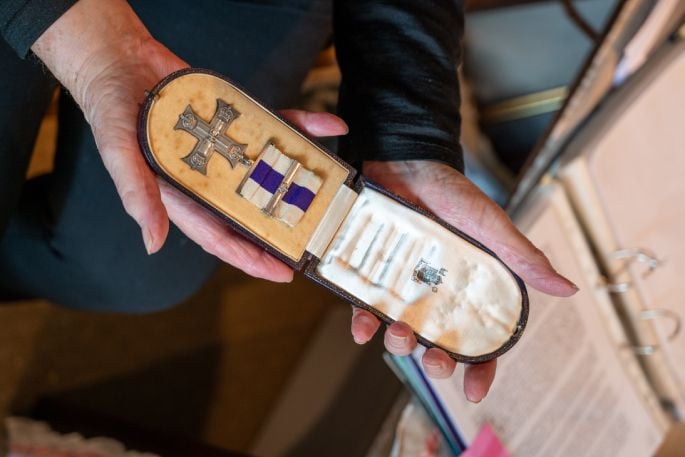
Jim Craig’s Military Cross. Photo/ David Hall
For years, the fate of HMS Triumph remained unclear.
Craig’s family received a telegram reporting him missing in action, but the story of his survival took a dramatic turn when Vatican Radio broadcast a message that brought hope to his wife, Hazel Craig.
Molloy’s quest to uncover the full story began about 10 years ago when she was contacted by a University of Edinburgh professor whose uncle had been aboard the Triumph. He asked Molloy for information about the exact time the submarine was due to return and pick up the crew and passengers it had dropped off, including her father. Robyn provided the necessary details from among her father’s papers.
Eight decades
The Triumph lay lost for eight decades, but the families of her crew began to find one another in 2010, eventually connecting more than 200 relatives.
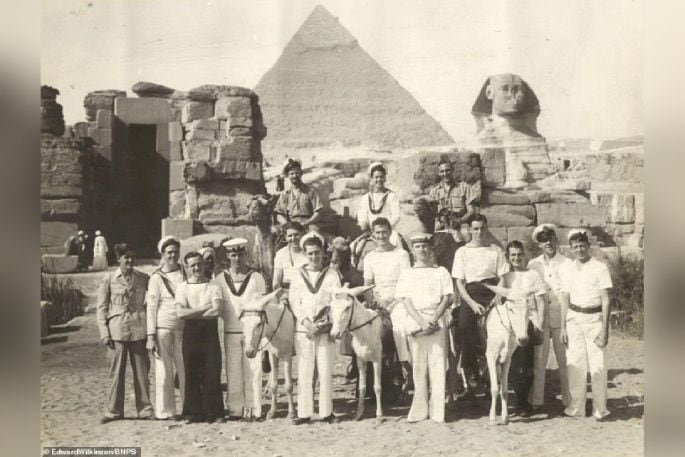
The last picture of the crew of HMS Triumph in Egypt before their final mission. Photo / Edward Wilkinson-BNPS
Last year the wreckage of the Triumph was discovered by veteran Greek underwater explorer Kostas Thoctarides, lying 200m below the surface of the Aegean Sea and a few miles from Cape Sounion in Greece.
The likely explanation for the Triumph’s sinking is one of its 21-inch torpedoes exploded while still in the torpedo stowage compartment in the bow of the submarine, causing it to plunge immediately to the sea floor.
“It was found in June 2023 with all 64 hands still on board at the bottom of the Mediterranean. It had gone down with the hatches open and was flooded,” Molloy said.
“When it was found, all the Christmas presents were still in the submarine.”
The Scottish professor, who’d contacted her 10 years ago, notified Molloy of the discovery.
“They had a commemoration cruise and laid wreaths over the submarine,” she said.
Molloy’s husband, Terry, travelled to Greece to attend the ceremony on her behalf because she was unable to attend due to health reasons.
While he was away, she went through a suitcase full of her father’s wartime papers.
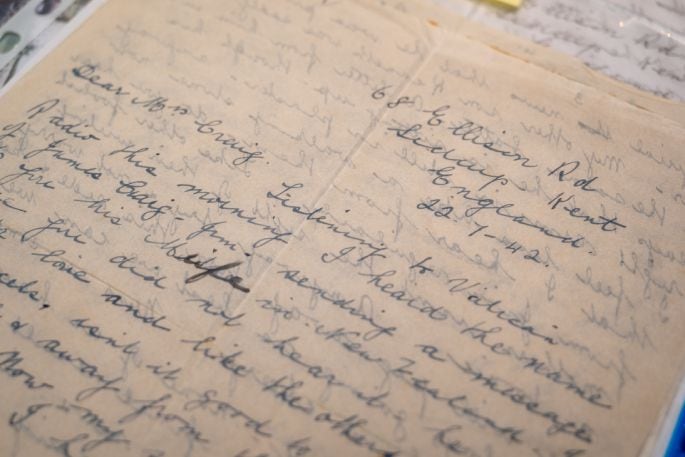
The letter written by Mrs H.M. (May) Shorey in England to Robyn Molloy’s mother. Photo/ David Hall
A letter
Among them, she uncovered a letter from Mrs H.M. (May) Shorey, an Englishwoman, revealing a remarkable connection to her father’s story.
“This woman [May Shorey] had heard a broadcast on Vatican Radio which contained a message for Hazel Craig: ‘Jim is alive and well, do not worry’. My mum had received a telegram saying he was missing, presumed dead,” Molloy said.
“May wrote to my mother on July 22, 1942, saying her husband and two sons were away fighting in the war, that she was thinking of Mum in New Zealand, and that she’d heard the message on Vatican Radio. She sent my father a parcel of chocolates and tobacco. He was in Padula, the same Italian prisoner-of-war camp as one of her sons.”
Molloy is now trying to find Shorey’s family. Despite efforts to locate them using online resources, her former address at 68 Ellison Rd, Sidcup, Kent, in England has been rebuilt post-war and further searches have yielded no conclusive leads.
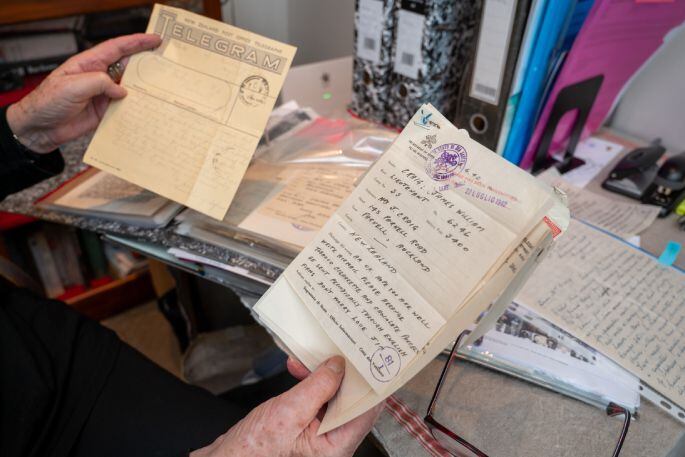
Telegrams amongst Jim Craig’s papers. Photo/ David Hall
In her search, Molloy also reflected on the larger story of her father’s survival.
“He was also working in Italy and he was captured and imprisoned, but he escaped several times. He jumped off a train twice and he was awarded a Military Cross and bar,” she said.
Honour
Jim Craig, who survived the war, was decorated twice with the Military Cross for his courageous work behind enemy lines in Greece and Italy.
Despite the harrowing nature of his experiences, Jim never spoke much about the war, a trait Robyn attributes to his stoic Scottish heritage.
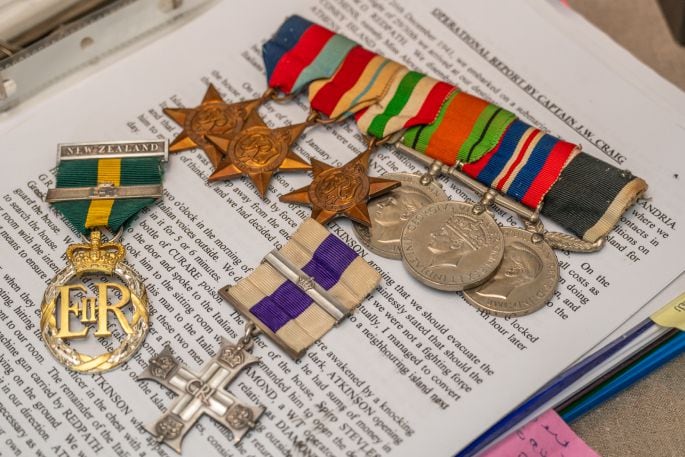
Jim Craig’s medals and military papers. Photo/ David Hall
As Molloy continues her search for Shorey’s family, she is inspired by the kindness and resilience of those who lived through the war.
“For someone to take the trouble in England during the Second World War to reach out and offer support to my mother in New Zealand … I want to find her family, not just to honour my father’s memory, but also to honour this woman who helped us in such a meaningful way,” Molloy said.
If you can help Molloy find the Shorey family, email: terryandrobyn.molloy@gmail.com

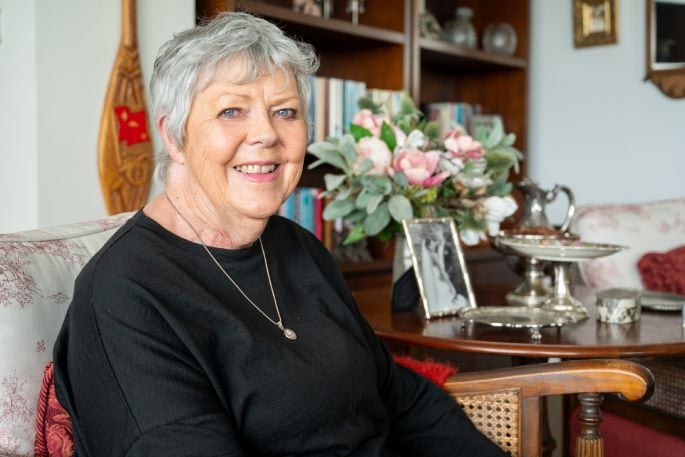

1 comment
Amazing
Posted on 20-12-2024 13:00 | By Justin T.
Now this is a story I would love to see through to its conclusion. Is there potentially a biography in the wings????
Leave a Comment
You must be logged in to make a comment.